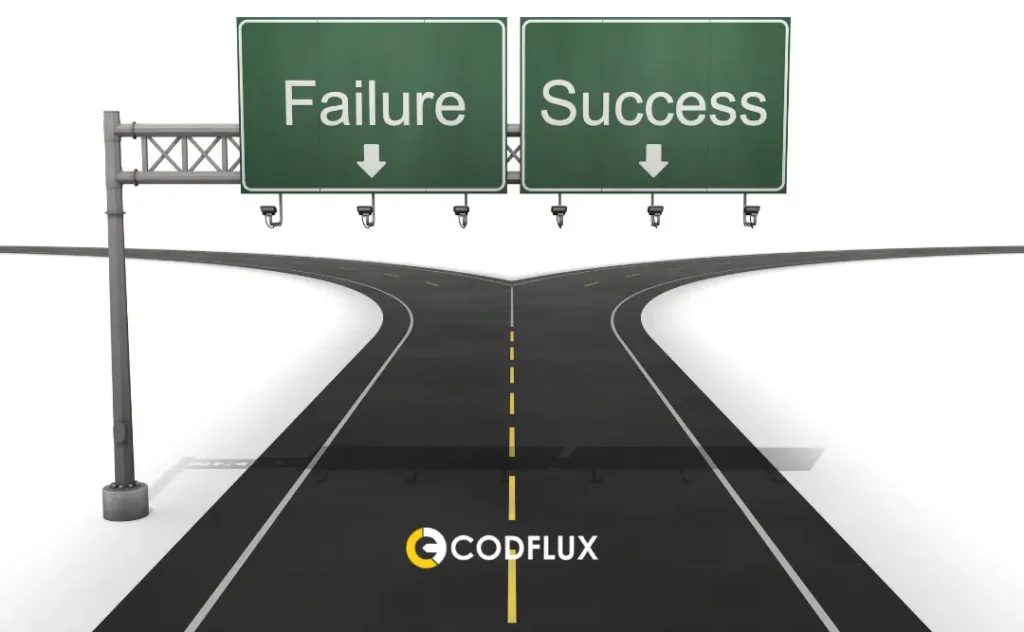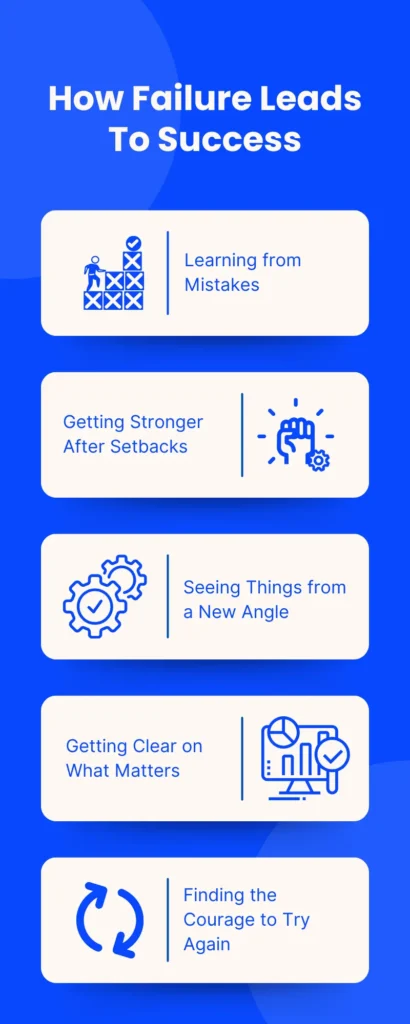Failure leads to success! It hits hard, like a punch in the stomach. After going through failures, coming back to work is the hardest. Confidence takes a dive, and you think, “Oh! I can’t do it again. It’s not my type of work,” or you hesitate to try something new again. I go through all of that in my entire journey.
But wait! Take a pause for a few seconds. Think about famous personalities like Steve Jobs, James Dyson, Thomas Edison, Bill Gates, Walt Disney, and Michael Jordan — did they never fail? No! They failed many times, and failure led them to success. Yeah! It’s true. I’m not kidding.
It’s a bitter reality; people avoid talking about failure and often focus on achievements. But what I’ve learned in the struggling periods of life is that success doesn’t come unless you face failures. In actuality, failure leads to success. Fail, learn, and succeed.
Well, here in this guide, we will talk about how failure leads to success, tips, and more. Want to learn how failing can help you succeed? Let’s quickly begin!
What is Failure and Success?

Failure means things do not happen as we plan to achieve our goals. Whenever you get failed, you learn a lot from that.
Comparatively, success is getting what plan without failing. Success and failure are both important parts of life. Both go side by side and often failure leads to success.
How?
Let’s explore!
How Failure Leads to Success?
Failure is a part of life and comes with a lot of lessons. It includes knowledge, resilience, seeing things from a new angle and more.

Learning from Mistakes
It is often the best teacher. When we make mistakes, we gain insights that guide us toward better decisions.
For example, James Dyson created 5,126 prototypes before perfecting his vacuum cleaner. How did he learn from this failure?
Each failure helped him learn what didn’t work, eventually leading to a successful product.
Getting Stronger After Setbacks
Failure can be tough, but it also builds resilience. Michael Jordan was rejected from his high school basketball team. Still, instead of giving up, he used that experience to work harder and eventually became one of the greatest basketball players of all time. Setbacks can make us stronger if we don’t let them defeat us.
Seeing Things from a New Angle
It forces us to rethink our approach. When Thomas Edison struggled to create a working light bulb, he didn’t give up — he found 10,000 ways that didn’t work, each of which led him closer to success. Failing often helps us see new possibilities that we hadn’t considered before.
Getting Clear on What Matters
Failure helps us focus on what’s truly important. Arianna Huffington was rejected by 36 publishers before her book became a bestseller.
What does she get after failure? Failures taught her to focus on her true passion — writing — and not get discouraged by rejections. Sometimes, failure helps us see what really matters and refine our goals.
Finding the Courage to Try Again
The courage to try again is one of the most powerful outcomes of failure. Walt Disney was fired from a newspaper job because he was told he lacked creativity. Instead of quitting, he went on to create the world-renowned Disney Empire. Each failure gave him the courage to keep pursuing his dreams.
What To Do When You Encounter Failure?
Failure can feel overwhelming, but it’s not the end—it’s a stepping stone to success. How you respond to setbacks, stay positive, analyze mistakes, and plan again your journey.
Stay Positive
Stay Positive
When failure strikes, it’s easy to feel down, but staying positive is key. A positive mindset helps you stay focused and keeps your energy up. Instead of dwelling on the setback, look for the silver lining and remind yourself that failure is just a part of the journey toward success.
Appreciate the People Around You
The people around you, whether friends, family, or colleagues, play a huge role in your recovery. Appreciate their support and encouragement. Their perspective, advice, and sometimes even their patience can give you the strength you need to keep going and help you learn from the experience.
Analyze the Situation
Take a step back and look at what went wrong. Analyze the situation carefully and try to understand the factors that contributed to the failure. This reflection can help you identify patterns, avoid repeating the same mistakes, and give you a clearer sense of where things went astray.
Identify Your Mistakes
It’s important to acknowledge your mistakes without feeling defeated. By identifying what went wrong, you can turn those mistakes into valuable lessons. Recognizing your role in the failure helps you take responsibility and empowers you to make better decisions moving forward.
Strategize and Try Again
Once you’ve analyzed the situation and learned from your mistakes, it’s time to come up with a new plan. Strategize on how to approach the challenge differently, set new goals, and try again with a fresh perspective. Remember, failure is not the end but an opportunity to improve and grow.
Conclusion
Failing can be tough, but it’s an essential part of achieving success. Every mistake offers an opportunity to learn, grow, and improve. As leaders, it’s important to create a culture where failure is seen not as a setback but as a valuable stepping stone. By encouraging employees to try new things, make mistakes, and learn from them, you empower them to innovate, build resilience, and ultimately succeed. Embrace failure as a natural part of the journey, and watch both individuals and organizations thrive.
Must read
The Benefits of Custom Website Development
Front-end vs Back-end Development
How to Choose a CMS for Website Development
Frequently Asked Questions
What is Failure?
Failure is the inability to achieve a desired goal or outcome. It’s a normal part of growth that provides lessons for improvement and future success.
Why Do People Fear Failure?
Fear of judgment or criticism.
Loss of self-confidence.
Uncertainty about consequences.
Perfectionist tendencies.
Emotional discomfort like disappointment.
Concern about delays in achieving goals.





